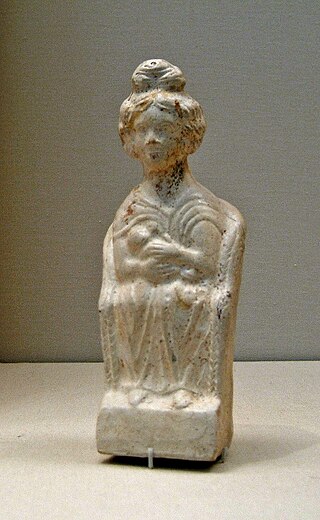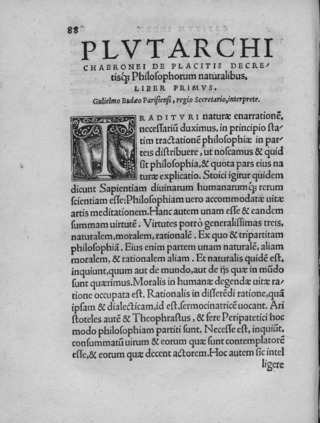Related Research Articles

Venus is a Roman goddess, whose functions encompass love, beauty, desire, sex, fertility, prosperity, and victory. In Roman mythology, she was the ancestor of the Roman people through her son, Aeneas, who survived the fall of Troy and fled to Italy. Julius Caesar claimed her as his ancestor. Venus was central to many religious festivals, and was revered in Roman religion under numerous cult titles.

Alpheus or Alpheios, was in Greek mythology a river and river god.
The Minyades were three Orchomenian (Arcadian) princesses in Greek mythology. These sisters were protagonists of a myth about the perils of neglecting the worship of Dionysus.

In Greek mythology, Peitho is the personification of persuasion. Her Roman equivalent is Suada or Suadela. She is typically presented as an important companion of Aphrodite. Her opposite is Bia, the personification of force. As a personification, she was sometimes imagined as a goddess and sometimes an abstract power with her name used both as a common and proper noun. There is evidence that Peitho was referred to as a goddess before she was referred to as an abstract concept, which is rare for a personification. Peitho represents both sexual and political persuasion. She is associated with the art of rhetoric.

Mater Matuta was an indigenous Latin goddess, whom the Romans eventually made equivalent to the dawn goddess Aurora, and the Greek goddess Eos. She was the goddess of female maturation and later also of the dawn. Her cult is attested several places in Latium; her most famous temple was located at Satricum. In Rome she had a temple on the north side of the Forum Boarium, allegedly built by Servius Tullius, destroyed in 506 B.C., and rebuilt by Marcus Furius Camillus in 396 B.C., and she was also associated with the sea harbors and ports, where there were other temples to her.

Tanaquil was the queen of Rome by marriage to Tarquinius Priscus, fifth king of Rome.
Quirites is the name of Roman citizens in their peacetime functions.

The Moralia is a group of manuscripts written in Ancient Greek, dating from the 10th–13th centuries, and traditionally ascribed to the 1st-century scholar Plutarch of Chaeronea. The eclectic collection contains 78 essays and transcribed speeches. They provide insights into Roman and Greek life, but they also include timeless observations. Many generations of Europeans have read or imitated them, including Michel de Montaigne, Renaissance Humanists and Enlightenment philosophers.
Spurius Carvilius Ruga was the freedman of Spurius Carvilius Maximus Ruga. He is often credited with inventing the Latin letter G. His invention would have been quickly adopted in the Roman Republic, because the letter C was, at the time, confusingly used both for the /k/ and /g/ sounds. For example, Ruga's own name contained this confusion: SPVRIVS CARVILIVS RVCA. In the latter half of the 3rd century B.C., Ruga is the first man in recorded history to have been attested as opening a private elementary school, although other such schools may have existed in Rome prior to his.

Aglaonice or Aganice of Thessaly was a Greek astronomer and thaumaturge of the 2nd or 1st century BC. She is mentioned in the writings of Plutarch and in the scholia to Apollonius of Rhodes as a female astronomer and as the daughter of Hegetor of Thessaly. She was regarded as a sorceress for her (self-proclaimed) ability to 'make the moon disappear from the sky' which has been taken – first by Plutarch and subsequently by modern astronomers – to mean that she could predict the time and general area where a lunar eclipse would occur.
In Greek mythology, Abrota, Abróte, or Habrotê was the daughter of eponymous King Onchestοs of the Boeotian city of Onchestos and sister of Megareus. Nisos, the king of Megara in the time of his reign married her and the supposed mother of his daughters, Scylla, Iphinoe and Eurynome.

The gens Porcia, rarely written Portia, was a plebeian family at Ancient Rome. Its members first appear in history during the third century BC. The first of the gens to achieve the consulship was Marcus Porcius Cato in 195 BC, and from then until imperial times, the Porcii regularly occupied the highest offices of the Roman state.
In Greek mythology, Alexida was a daughter of Amphiaraus, from whom certain divinities called Elasii were believed to be descended.
Murcia was a little-known goddess in ancient Rome. Her name occurs as a surname of Venus.
Gaius is a Latin praenomen, or personal name, and was one of the most common names throughout Roman history. The feminine form is Gaia. The praenomen was used by both patrician and plebeian families, and gave rise to the patronymic gens Gavia. The name was regularly abbreviated C., based on the original spelling, Caius, which dates from the period before the letters "C" and "G" were differentiated. Inverted, Ɔ. stood for the feminine, Gaia.
In Greek mythology, Glaucia was a daughter of the Trojan river god Scamander.

Talasius is also known as Thalasius, Talassus and Talassio is a god of marriage in Roman mythology. His equivalent in Greek mythology is Hymen. His name was called out during marriages. The name was derived from Thalasus, which means "wool-basket". Later accounts state that he is friend of Romulus, and that he played a role in the rape of the Sabine women.

In Greek mythology, Clymene or Klymene was the name of an Oceanid nymph loved by the sun god Helios and the mother by him of Phaethon and the Heliades. In most versions, Clymene is the one to reveal to Phaethon his divine parentage and encourage him to seek out his father, and even drive his solar chariot.
In Greek mythology, Melantheia or Melanthea was the daughter of the river-god Alpheus, and thus she can be counted as a naiad. Melanthea bore to Poseidon, Eirene whom the earlier name of Calaurea was called after her (Eirenê). Later on, this island was named Anthedonia and Hypereia by the companions of the siblings Anthus and Hypera.
The gens Tarutia, also found as Tarrutia, was an obscure plebeian family at ancient Rome. Few members of this gens are mentioned in Roman history, of whom the best-known is probably Lucius Tarutius Firmanus, a noted mathematician and astrologer of the first century BC.
References
- ↑ Mayo, Robert (1819). A new system of mythology: in three volumes; giving a full account of the idolatry of the pagan world; Vol. 3. Philadelphia.
- ↑ Francis Lieber, ed. (1835). "Suada, or Suadela". Encyclopædia Americana. Vol. 12 (New ed.). Philadelphia. p. 37.
- ↑ Plutarch, Quaestiones Romanae, sect.2